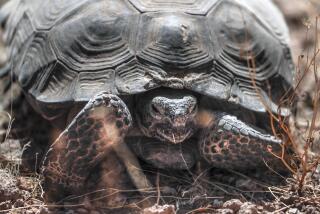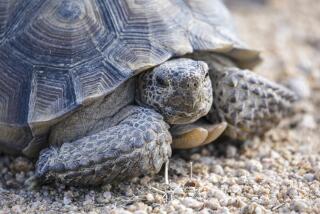The Cutest Lobbyists : Tortoises Parade in Capitol to Celebrate Desert Protection Act
- Share via
Moments after President Clinton signed the Desert Protection Act into law this week, four baby tortoises and their older brother slowly made their way across his desk to greet him.
The tortoises belong to Whittier residents Elden and Patty Hughes and are known around Capitol Hill as some of the cutest lobbyists in town. The Hugheses, active members of the Sierra Club, have made about nine trips to Washington with the reptiles in tow to give lawmakers a living example of what the recently signed bill will protect.
“Elden supplies the facts and the tortoises make the desert real,” Patty Hughes said.
The reptiles have paraded before senators, representatives and Cabinet members. But they spend most of their time at home in Whittier, eating, sleeping and crawling around the Hugheses’ back yard.
The couple has a state permit to keep their 33 tortoises, some of which were rescued after illnesses, injuries and habitat destruction. Most were born in captivity. The Mojave Desert tortoises are designated by the government as threatened.
The animals cannot be returned to the wild once they are domesticated because they might not survive or might spread disease, Hughes said.
But the family of tortoises, which range in age from 2 years to about 80, seem to enjoy their specially built pen. The enclosure features plenty of soft dirt, plants for grazing, underground burrows with a built-in thermostat and a large net to keep predators, such as crows and blue jays, out.
The couple, who have been lobbying for the Desert Protection Act since 1986, adopted four tortoises in 1989 from their former keeper. The original clan, three large females and a male, Mr. BeeBe, have lived with the Hugheses and reproduced rapidly, hatching about 26 babies since they came to Whittier.
As Elden Hughes puts it, “Mr. BeeBe is most attentive to the ladies.”
Though the tortoises are beginning to hibernate for the winter, many were on hand Thursday, basking in the sun and chomping hibiscus flowers. The creatures are vegetarian and live on a diet of flowers, frozen vegetables and vitamins.
Kristin H. Berry, a research scientist with the National Biological Survey in Riverside who has spent 24 years studying desert tortoises, said they are threatened in their native habitat by such factors as disease, vandalism, agriculture, off-road vehicles, natural predators and development.
“In California, most of (the) factors boil down to man,” Berry said.
More to Read
Get the L.A. Times Politics newsletter
Deeply reported insights into legislation, politics and policy from Sacramento, Washington and beyond. In your inbox twice per week.
You may occasionally receive promotional content from the Los Angeles Times.










